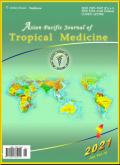Aeromonas hydrophila infection in acute myeloid leukemia: A case report
IF 1.6
4区 医学
Q3 PUBLIC, ENVIRONMENTAL & OCCUPATIONAL HEALTH
引用次数: 0
Abstract
Rationale: Aeromonas hydrophila , a bacterium commonly found in a variety of soils, aquatic habitats, and other natural environments, is known for causing infections and hemorrhagic diseases in both aquatic and terrestrial animals. Patients with leukemia, when infected by Aeromonas hydrophila following chemotherapy, face an increased risk of developing necrotizing fasciitis. Patient concerns: A 48-year-old male with a history of acute myeloid leukemia presented with swelling and pain in his right hand after being stabbed by a grass carp two days ago. The injury occurred on the fifth day after his last chemotherapy session when he was accidentally punctured in the right thumb and ring finger by a carp while fishing. Two days following the injury, the skin isurrounding the wound turned black immediately, while the rest of his hand was reddened, swollen, and bleeding. Diagnosis: Aeromonas hydrophila infection in the soft tissue of the right hand. Interventions: Intravenous antibiotics and local debridement. Outcomes: The patient experienced an alleviation of systemic poisoning symptoms, effective control of the local wound infection. Lessons: It is important for physicians to appreciate the potential for highly unusual and life-threatening infections in patients with acute myeloid leukemia. Early diagnosis and prompt treatment can prevent the development of necrotizing fasciitis and save patients' lives.急性髓系白血病并发嗜水气单胞菌感染1例
理由:嗜水气单胞菌是一种常见于各种土壤、水生生境和其他自然环境中的细菌,它能在水生和陆生动物中引起感染和出血性疾病。白血病患者,当化疗后感染嗜水气单胞菌时,面临发展为坏死性筋膜炎的风险增加。患者关注:48岁男性,有急性髓性白血病病史,两天前被草鱼刺伤,右手肿胀疼痛。受伤发生在他最后一次化疗后的第五天,当时他钓鱼时不小心被一条鲤鱼刺穿了右手拇指和无名指。受伤两天后,伤口周围的皮肤立即变黑,而他的手的其余部分变红、肿胀和流血。诊断:右手软组织嗜水气单胞菌感染。干预措施:静脉注射抗生素和局部清创。结果:患者全身中毒症状减轻,局部伤口感染得到有效控制。经验教训:对于医生来说,认识到急性髓性白血病患者发生高度不寻常和危及生命的感染的可能性是很重要的。早期诊断和及时治疗可以预防坏死性筋膜炎的发展,挽救患者的生命。
本文章由计算机程序翻译,如有差异,请以英文原文为准。
求助全文
约1分钟内获得全文
求助全文
来源期刊

Asian Pacific journal of tropical medicine
PUBLIC, ENVIRONMENTAL & OCCUPATIONAL HEALTH-TROPICAL MEDICINE
CiteScore
4.00
自引率
9.70%
发文量
1936
审稿时长
3-8 weeks
期刊介绍:
Asian Pacific Journal of Tropical Medicine (ISSN 1995-7645 CODEN: APJTB6), a publication of Editorial office of Hainan Medical University,is a peer-reviewed print + online Monthly journal. The journal''s full text is available online at http://www.apjtm.org/. The journal allows free access (Open Access) to its contents and permits authors to self-archive final accepted version of the articles on any OAI-compliant institutional / subject-based repository.
APJTM aims to provide an academic communicating platform for international physicians, medical scientists, allied health scientists and public health workers, especially those of the Asia-Pacific region and worldwide on tropical medicine, infectious diseases and public health, and to meet the growing challenges of understanding, preventing and controlling the dramatic global emergence and re-emergence of infectious diseases in the Asia-Pacific.
The journal is proud to have an international and diverse editorial board that will assist and facilitate the publication of articles that reflect a global view on tropical medicine, infectious diseases and public health, as well as emphasizing our focus on supporting the needs of public health practitioners. The APJTM will allow us to seek opportunities to work with others who share our aim, and to enhance our work through partnership, and to uphold the standards of our profession and contribute to its advancement.
 求助内容:
求助内容: 应助结果提醒方式:
应助结果提醒方式:


